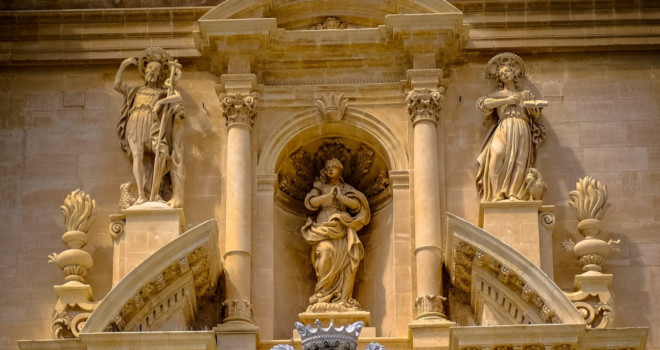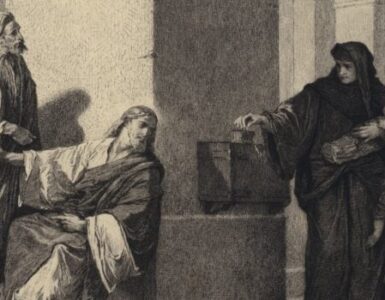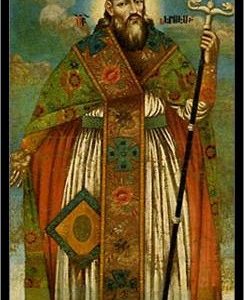Speaking the truth in love, we are to grow up in every way into Him who is the head, into Christ. . . . Therefore, putting away falsehood, let everyone speak the truth with his neighbor, for we are members one of another.
— Ephesians 4:15, 25
One day the holy fifteenth-century Polish priest St. John
of Kanty was walking down a country road when he was stopped by some robbers;
they took the money in his bag and demanded to know whether he had any more.
John said no, and the robbers departed. Immediately after this, however, John
remembered that he had some coins sewn into his cloak, so he hurried after the
highwaymen, caught up with them, and, apologizing for his error, handed over
the additional coins. The robbers were so amazed by his honesty that they
returned everything they had taken from him.
The type of holy and absolute honesty demonstrated by St. John
of Kanty is very surprising to us today — perhaps, in part, because our society
has made honesty a relative thing. “It was only a little white lie”; “I don’t
cheat on my taxes as much as most people do”; “If I told my boss what I really
think of her idea, I’d never get that promotion, and that would be bad for
my family.” The Seventh Commandment does not say, “You shall not steal unless
it’s something you really need or want.” The Eighth Commandment does not
say, “You shall not bear false witness unless you have a really good reason.”
These commandments call us to be honest, for, as God’s children, we are meant
to imitate our Father — and no falsehood will ever be found in Him.
John’s actions certainly went above and beyond the call of
duty, for while we’re expected to be honest, there are certain limits. For
instance, we’re not morally required to reveal information to people who have
no legitimate authority or right to ask it of us, and — while outright lying
should be avoided — we’re entitled to use mental reservations in answering
unjust questions. For instance, when asked by robbers whether we have any
money, we may add to our negative response the unspoken statement “At least,
not any that I wish to give to you.”
St. Athanasius practiced this sort of “silent honesty” or
“holy deception” when he was being pursued down a river by some enemies who
didn’t know him by sight. From his boat, he turned back toward them, and when
they asked, “Have you seen Athanasius the bishop?” he responded truthfully,
“It’s only a short time since he passed this very spot, going up the river.” By
practicing our Lord’s advice to be as clever as snakes and innocent as doves (Matt.
10:16), Athanasius managed to escape.
Deceptions, of course, can also serve selfish purposes.
Before her conversion, St. Joan Delanoue was quite concerned with becoming rich
and very unconcerned with the plight of the poor. She would deliberately wait
until almost suppertime to send her niece out to purchase food for the
household’s evening meal; that way, if beggars came to her door earlier in the
day, she could truthfully tell them, “There’s no food in the house.” This ruse —
in which honesty was turned into an illegitimate servant of greed — was common
knowledge to Joan’s neighbors; they were disedified by her stinginess, but,
after her conversion, they were amazed by her newfound generosity.
Jesus praised honesty, while also encouraging those who
had fallen short of this ideal, as we see in the story of Zacchaeus. As the chief
tax collector of Jericho,
Zacchaeus was a very wealthy man, and the implication is obvious: he acquired
most of his wealth by cheating people and by accepting kickbacks from the other
tax collectors under his supervision. This is why people murmured in shock and
disapproval when Jesus invited Himself to Zacchaeus’s house — a gentle,
non-threatening way of calling a known sinner to a change of heart. This most
unpopular of men responded wholeheartedly, saying, “Behold, Lord, the half of
my goods I give to the poor; and if I have defrauded anyone of anything, I
restore it fourfold.” (Luke 19:8) This was quite a promise, for everyone in
earshot knew it wasn’t a question of whether Zacchaeus had cheated
anyone. Redeeming his pledge would have taken most, if not all, of his wealth.
The importance of honesty, and also our Lord’s recognition of Zacchaeus’s
sincerity, is demonstrated by Jesus’ words: “Today salvation has come to
this house.” (Luke 19:9)
It was from tax collectors — men universally assumed to be
greedy and dishonest — that Jesus chose one of His Apostles (Mark 2:14). We
have no way of knowing whether St. Matthew was personally dishonest, relatively
honest, or completely honest prior to his calling — but his eager response to
Christ, and his years of service as an apostle and evangelist, indicate that
from the time He was called, his life was marked by integrity and
righteousness.
The Church has always valued honesty, for God’s grace can
be fully active only within persons who humbly and truthfully admit their need
for it. This is why, for instance, St. Ignatius of Loyola, following his
conversion, prepared very carefully before making a general confession (in
which a person confesses the sins of his entire life). It took him three days
to remember and write down all his sins. God rewarded this honesty by giving
the founder of the Jesuits a profound understanding of the workings of the
human soul, allowing Ignatius to become one of history’s spiritual geniuses.
Honesty is not only a matter of proclaiming the truth, but
also of treating others justly — especially when someone’s life is at stake.
The fourteenth-century nobleman St. Conrad of Piacenza was out hunting one day and ordered
his attendants to flush out game by setting fire to some brushwood.
Unfortunately, a sudden wind carried the fire into a cornfield, and from there
it spread to the neighboring villages. Unable to extinguish the fire, Conrad and
his attendants returned home, intending to say nothing, but a poor man
gathering firewood nearby was blamed for the disaster and sentenced to death.
Learning of this, Conrad was filled with remorse and publicly admitted his
responsibility. He was ordered to pay restitution for all the damage, which
took virtually everything he owned, plus his wife’s dowry. Accepting this as a
sign from God, the two of them gave away the remainder of their estate, and
then each entered religious life.
Honesty demands a suitable respect for other people’s
property. St. Edward the Confessor, who became King of England in 1042, was
told that a certain tax was still being levied on the people, even though its
original purpose had long since passed. Seeing the vaults containing the money
that had been raised in this way, the holy king exclaimed, “On every chest I
see a black devil sitting and sticking his hooked claws into the gold. They are
the rulers down here, not I. Let the money be distributed to the poor, and stop
collecting the tax, and so we shall rid the realm of these devils.” On another
occasion St. Edward’s keen sense of justice led him to order the return of
money that had been collected as a gift to him from all his subjects — the poor
included. He knew that divine riches cannot be mingled with earthly wealth that
has been acquired in an unjust or uncharitable way.
We must take this lesson to heart. Ours is the richest
society in history — and also one severely lacking in honesty and justice. Only
if we as individuals and as a nation strive to be honest will we experience, in
Jesus’ words, the truth that sets us free (John 8:32).
For Further Reflection
“God
will not hear our prayers unless we acknowledge ourselves to be sinners. We do this when we ponder our own sins alone,
and not those of our neighbor.” — St. Moses of Ethiopia
“Truly
honest persons possess a harmonious and pleasant demeanor: nothing reproachable
can be found in their actions, nothing inappropriate in their words, nothing
indecent in their manner. Being
spontaneous and respectful, their behavior wins the admiration and goodwill of
all.” — St. Anthony of Padua
“Whoever
manages his affairs with artifices and subterfuges offends the Providence of
God and renders himself unworthy of His paternal care.” — St.
Vincent de Paul
Something You Might Try
·How
do you develop the virtue of honesty if you’ve been lacking in it? Aristotle
says, “One becomes a mason only by laying bricks and a sculptor by handling the
chisel; even so one acquires a virtue only by exercising it.” This means that
the only way to become honest is by being honest. Start with yourself;
admit your faults. Then be honest with God; admit your absolute need for Him.
Then be honest with others; actively look for opportunities to tell the truth
in situations when it goes against your own interests or when you’d normally
lie. Reward yourself each time you tell the truth, especially when telling the
truth isn’t easy.
·When it comes to business and financial transactions, St. Francis de Sales offers us this advice: “Always be impartial and just in your deeds. Put yourself in your neighbor’s place, and then you will judge fairly. When you buy, act as though you were the seller, and when you sell, act as though you were the buyer, and you will buy and sell with justice.” Looking out for the interest of the other person, instead of your own, may strike you as self-defeating — but in fact, it’s a way of unlocking God’s blessings (for the Lord is never outdone in generosity), while giving you an inner peace that no amount of money can buy.
✠
Other saintly resources from Fr. Joseph Esper can be found here on Catholic Exchange, such as in the article “Learning to Forgive Through the Saints.”
This article is adapted from a chapter in Fr. Esper’s Saintly Solutions to Life’s Common Problems. It is available as a paperback or ebook from your favorite bookstore or online through Sophia Institute Press.
Photo by Francesco Ungaro on Unsplash













